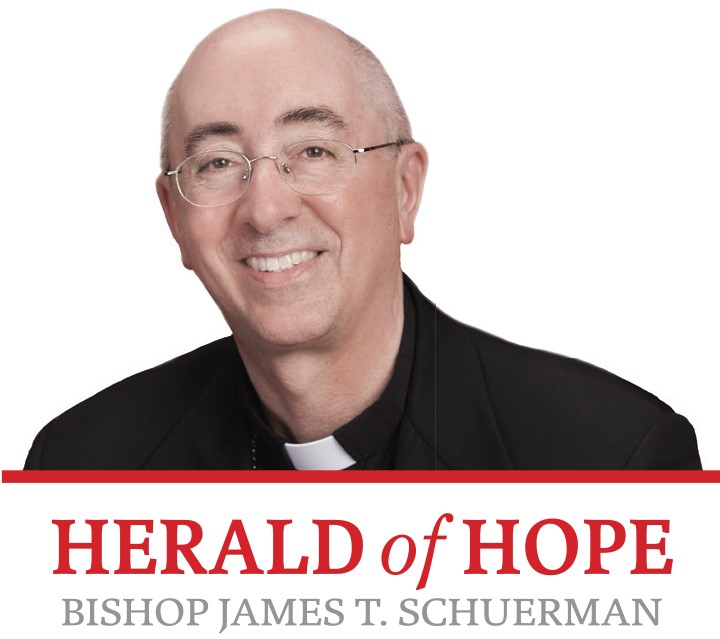Herald of Hope
At the beginning of a New Year, we typically find ourselves desiring and praying for many things: health, steady employment, the safety and well-being of family members and friends, and the healing of broken or damaged relationships. Perhaps our most profound prayer at the beginning of the year is our prayer for peace – peace between the nations, peace in our neighborhoods and peace within our hearts.
Jan. 1 was the 55th World Day of Peace, a day established by Pope St. Paul VI in 1967 and first celebrated Jan. 1, 1968. In that message for the first World Day of Peace, the pope wrote that he desired that “every year, this commemoration be repeated as a hope and as a promise, at the beginning of the calendar which measures and outlines the path of human life in time, that Peace with its just and beneficent equilibrium may dominate the development of events to come.”
In his “Message for the 55th World Day of Peace,” Pope Francis begins with a verse from the Book of the Prophet Isaiah: “How beautiful upon the mountains are the feet of the messenger who announces peace.” (Isaiah 52:7) The prophet describes a scene in which the sentinels standing on the walls of the desolate and ruined city of Jerusalem await a message of hope. The messenger, running toward the city, brings good news of the return of the captives from the Babylonian exile. Even from a distance, the sentinels can tell that messenger bears good news of salvation and peace. It is a prophecy of a better time to come, a time of peace, security and happiness for God’s people.
In his message, Pope Francis comments that peace is something that remains distant from far too many members of the human family. War and conflict seem to be intensifying in many parts of the globe, the ongoing pandemic plagues the nations, hunger is a reality for many, environmental degradation is worsening and economic disparity prevails. Like the sentinels on the walls of Jerusalem, we await a sign of hope for a more peaceful world.
Pope Francis explains that peace is both a divine gift and the fruit of shared human commitment. All people can participate in making this world a more peaceful one – that includes individuals working on their own hearts, healing relationships in their families and working on positive changes in society. In this year’s message for the World Day of Peace, Pope Francis proposes three paths to peace: the promotion of intergenerational dialogue, investment in education and improved labor conditions.
First, dialogue between the generations is necessary to build peace. Acknowledging the fact that technology and current economic situations have widened the gap between the generations, Pope Francis sees the urgency of building an intergenerational partnership. He writes, “Young people need the wisdom and experience of the elderly, while those who are older need the support, affection, creativity and dynamism of the young.”
The world lacks peace, in part, because of individuals and groups pushing immediate self-interests and acting as if there were no past or future. We can only meet great challenges in the world when there is dialogue between “the keepers of memory – the elderly – and those who move history forward – the young.” Healthy politics depend upon encounter and dialogue between the generations. To be truly rooted in the present, we must revisit the past. Pope Francis writes that we must “learn from history and heal old wounds” and look to the future to awaken hope and allow our dreams to emerge.
Second, education serves as a driver of peace. Education empowers people and opens new opportunities for them to develop and grow. Unfortunately, there has been a significant reduction in funding worldwide for education and training, which are essential for promoting human development, and indispensable for the promotion and defense of peace.
According to Pope Francis, “teaching and education are the foundations of a cohesive civil society capable of generating hope, prosperity and progress.” He urges governments to invest more in education than in weaponry. His hope is that investment in education will be accompanied by the promotion of a “culture of care” in which a healthy dialogue between cultural components within society lead to breaking down divisions and building bridges between individuals and groups.
Third, Pope Francis writes that labor “is an indispensable factor in building and keeping peace.” Justice and solidarity build upon the foundation of labor. For that reason, there is an urgency to promote decent working conditions oriented to the common good. A fair balance between economic freedom and social justice is needed to help build a society of peace.
Fair labor practices and safe working conditions are essential elements in a peaceful society. Pope Francis urges companies to respect the human rights of workers, and urges consumers, civil society and business entities to become more aware of the conditions of laborers and to act responsibly in upholding their rights.
Pope Francis concludes his message by saying, “May more and more men and women strive daily, with quiet humility and courage, to be artisans of peace. And may they be ever inspired and accompanied by the blessings of the God of peace.” Peace is a divine gift that calls for human commitment and cooperation.
“How beautiful upon the mountains are the feet of the messenger who announces peace.” As a New Year begins, we pray that God make us messengers of peace in this world.

